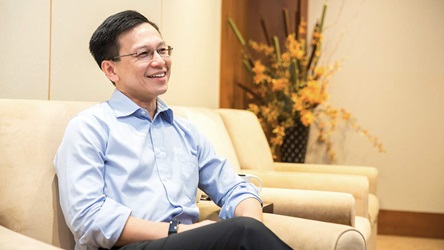An Expansive Mindset Is Liberating

What has a simple project to answer secondary- school physics questions got to do with the Public Service’s approach to innovation? Plenty, it seems.
When a team of teachers realised that not every student had the chance to ask questions in class, working together with engineers in a makeathon, they came up with a prototype of a chatbot that could answer basic physics questions. More time could then be spent discussing difficult ones.
Such a simple but innovative project is a good example of how technology, pedagogy and behavioural insights can help solve problems in the classroom, pointed out ExCEL chair Mr Neo Kian Hong.
“When people mobilise their resources and work together, it can result in very powerful solutions,” he said.
In the Public Service, he observed, problem-solving has evolved from working only within one’s agency. Greater diversity and complexity has led to multidisciplinary and cross-cultural approaches.
“You are not just working alone or in a silo, but with everyone in the Public Service to create solutions,” said Mr Neo, who in 2015 took over the ExCEL (Excellence in Continuous Enterprise and Learning) movement, which drives and recognises innovation in the Public Service. He is also Permanent Secretary (Education Development). Being able to look beyond one’s agency or ministry, to the resources of the wider Public Service, all of Singapore, or even international friends, will empower officers in seeking solutions, he said.
“An expansive mindset, in thinking about resources, connections and expertise, is liberating and will enable us not only to do more with less but also be bolder in dreams and transformation,” the 52-year-old added.
At a Public Service Week makeathon in 2016, there was a suggestion to view public officers with a “LinkedIn perspective”: officers should become known for the work they do, their projects and the skills they can bring to the table – no matter which agency they belong to.
Mr Neo explained: “If you have been involved in certain makeathons, everyone knows what your deep expertise is; you are recognised as an expert and you will be called upon for new projects.” This also assures public officers they can be bold because there is access to expertise within the Service.
And though the ExCEL awards will continue to be presented to “send signals that we do recognise innovation champions”, Mr Neo said, it is both the recognition of one’s own skills and being involved in various projects that create the “intrinsic” pride in being a champion of innovation. This will motivate officers to continually deepen their skills.
Changes to sustain culture
An ExCEL secretariat member who works closely with Mr Neo for ExCEL shared: “When he came on board, he made everyone step back, start a conversation about what we are doing and start afresh.”
Mr Neo shared three observations. First, there is already a healthy culture of innovation in the Service, with many public officers raising good suggestions. What needs to be encouraged now is broader perspectives and multidisciplinary involvement.
Next, any innovation first requires a body of knowledge and expertise. “The question is whether there is a vibrant learning community within each domain of knowledge, and whether there is a rapid accumulation of deep knowledge,” he said.
Third, innovation is best learned by doing. That is why makeathons are great platforms – they are safe spaces to test ideas with minimal time commitment; involve a whole range of stakeholders, perspectives and skills; and allow solutions to be crowdsourced. With clear problem statements that engage and motivate the participants, makeathons often produce interesting new solutions.
For ExCEL, Mr Neo has encouraged a Community of Innovation Directors, whose task is to build environments conducive for innovation in their agencies, with supporting processes and structures. These 70-odd Innovation Directors, one from every agency, meet quarterly to get inspiration from invited public- and private-sector speakers. They then bring the ideas and insights back to their agencies. The ExCEL team is working with the Civil Service College to design training programmes for Innovation Directors and practitioners.
To encourage public officers to pursue their ideas further, the Public Service Innovation Challenge was launched in 2016. It offers funding and other resources for public officers to prototype their ideas.
The purpose of ExCEL has not changed, but “certainly we have found better ways to achieve the outcomes of innovation,” said Mr Neo. “In a way, Workplace by Facebook [can] become the new Suggestion Scheme, and makeathons the new Work Improvement Teams projects. And rather than having ExCEL committees, we encourage learning communities.”
A background
The former Chief of Defence Force developed his beliefs from some of his experiences working with diverse groups, such as when combating the Severe Acute Respiratory Syndrome (SARS) outbreak, being part of an international peacekeeping task force in East Timor, and working with the Home Team on homeland security.
During the SARS crisis, for instance, when Mr Neo was Director of Operations at the Ministry of Health, the way in which home quarantine orders were first issued was not ideal, he revealed. A police officer would be sent to order the occupant to stay home, as a monitoring device was fixed. “It actually made affected people feel like they were criminals and neighbours shunned them.”
Working with the medical and grassroots communities, the team improved that approach. The new procedure saw a nurse fronting the engagement to assure the quarantined person that it was just a precautionary measure, after which someone from the community, usually a helpful neighbour, would ask if the resident needed help with groceries. “Suddenly, the citizen’s experience changes from that of fear to one of being cared for. We humanised the solution.”
Going forward
To create a better tomorrow, said Mr Neo, the Public Service must tap the “maximum potential” of the people and the private sector too. For example, in education, there is a need for everyone to shift their mindset and focus from grades to skills, and from learning in the classroom to lifelong learning.
Technology is also playing a bigger role, especially as Singapore is to become a Smart Nation. “We need a public service transformation to exploit technology to provide the best service to our people,” said Mr Neo. In education, there are plans for a Student Learning Space, a national Web-based platform to showcase the best learning resources, open to all students and teachers. “Students from different schools would be able to view, say, a video of an excellent teacher teaching a particular subject,” he said.
On those who are slower to explore and act on new ideas to solve problems, and who require more direction or motivation, Mr Neo prefers to stay positive.
“Perhaps they may have felt that they see that problems are too big for them or the same suggestions, year in, year out, have not being implemented. But once you change their perspective to one of an expansive mindset, they will realise it’s possible. We need to be patient, to encourage, enable and persuade them.”

What’s in your cuppa? Latte
Where and when do you have it? At home from my coffee machine. I have it every day [in the morning], with my wife.
- POSTED ON
May 12, 2017
- TEXT BY
Wong Sher Maine
- PHOTOS BY
Charles Chua
- ART DIRECTION BY
Yip Siew Fei
-
Deep Dive
When Less Is More








.tmb-tmb450x250.jpg)
